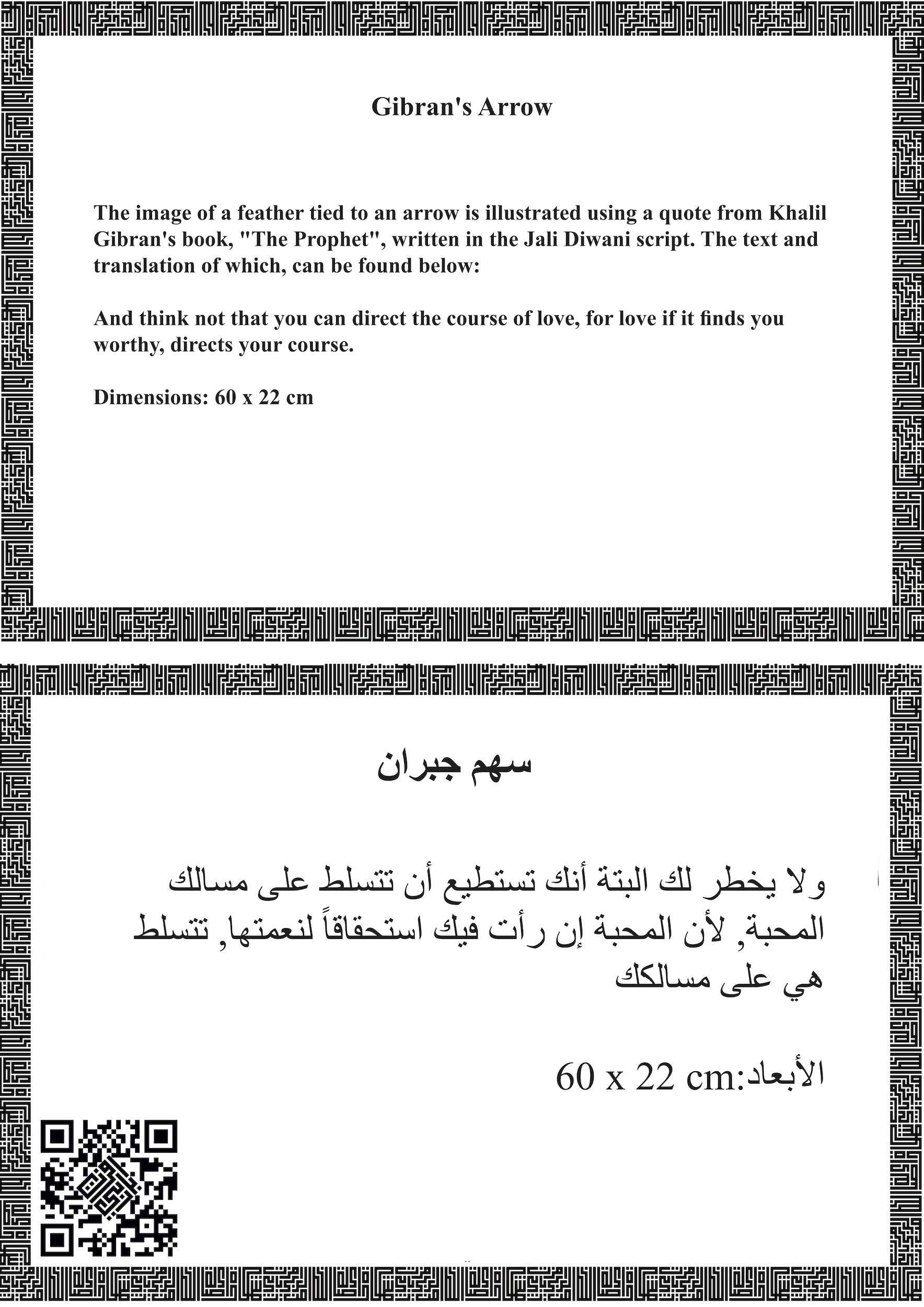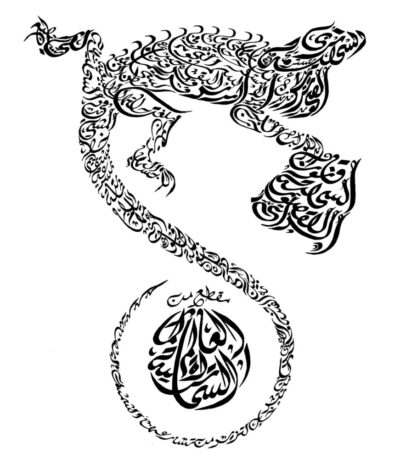Original price was: $120.00.$106.00Current price is: $106.00.
Arabic Calligraphy Print– Gibran’s Arrow
“And think not that you can direct the course of love, for love if it finds you worthy, directs your course.” -Khalil Gibran
Dimensions: 60 x 25 cm
Year: 2015
Medium: Ink on paper.
5 in stock
Description
The image of a feather tied to an arrow is illustrated using a quote from Khalil Gibran’s book, “The Prophet”, written in the Jali Diwani script. The text and translation of which, can be found below:
ولا يخطر لك البتة أنك تستطيع أن تتسلط على مسالك المحبة, لأن المحبة إن رأت فيك استحقاقاً لنعمتها, تتسلط هي على مسالكك
And think not that you can direct the course of love, for love if it finds you worthy, directs your course.
Khalil Gibran was born in the town of Bsharri, Lebanon in 1883. He is certainly the most famous Lebanese cultural icon and the third most published poet in history. Moving back and forth from the USA and Lebanon, he wrote many poems and essays in both English and Arabic, in addition to being an accomplished painter.
“The Prophet” a collection of 26 prose poetry essays was published in 1923 and is regarded as his most famous and influential work.
The Jali Diwani script was developed in 16th century Ottoman Turkey for mostly ornamental and bureaucratic use. Its complex interweaving of letters makes it both highly ornamental and difficult to forge, hence why it was frequently used on official documents and seals.
إن صورة الريشة المربوطة بسهم مرسومة بخط الديواني الجلي و هي اقتباس من كتاب جبران خليل جبران “النبي”
النص المترجم:
“ولا تعتقد أنه يمكنك توجيه مسار الحب ، فالحب إذا وجدك جديراً ، يوجه مسارك.”
وُلد خليل جبران في بلدة بشري في لبنان عام 1883، وهو بالتأكيد أشهر رمز ثقافي لبناني وثالث أكثر شاعر نشرت أعماله في التاريخ. تنقل بين لبنان والولايات المتحدة و كتب العديد من النصوص والقصائد باللغة العربية والانجليزية بالإضافة إلى كونه رسّاماً ماهراً.
“النبي” هي مجموعة من ٢٦ مقالة شعرية نثرية نُشرت عام 1923 وتعتبر من أشهر أعماله وأكثرها تأثيراً.
تم تطوير خط الديواني الجلي في القرن السادس عشر في الدولة العثمانية أو ما تعرف الان بتركيا و له استخدامات مختلفة منها الزينة والبيروقراطية غالباً. إن من الصعب تزوير هذه الكتابة بسبب الحروف المعقدة والمتشابكة الذي يجعلها مناسبة لاستعمالاتها . ولهذا السبب تم استخدامها بشكل متكرر في الوثائق والأختام الرسمية.
L’image d’une plume attachée à une flèche est illustrée à l’aide d’une citation du livre de Khalil Gibran, “Le Prophète”, écrit dans le script Jali Diwani. Vous trouverez ci-dessous le texte et la traduction :
“ Et ne pense pas que tu puisses diriger le cours de l’amour, car l’amour s’il te trouve digne, dirige ton cours. ”
Khalil Gibran est né dans la ville de Bcharreh, au Liban, en 1883. Il est l’icône culturelle libanaise la plus célèbre et le troisième poète le plus publié de l’histoire. Faisant des allers-retours entre les États-Unis et le Liban, il a écrit de nombreux poèmes et essais en anglais et en arabe, en plus d’être un peintre accompli.
« Le Prophète », un recueil de 26 essais de poésie en prose, a été publié en 1923 et est considéré comme son œuvre la plus célèbre et la plus influente.
L’écriture Jali Diwani a été développée dans la Turquie ottomane du XVIe siècle à des fins principalement ornementales et bureaucratiques. Ses lettres complexes entrelacées le rendent à la fois très ornemental et difficile à falsifier, c’est pourquoi il était fréquemment utilisé sur les documents officiels et les sceaux.







Reviews
There are no reviews yet.